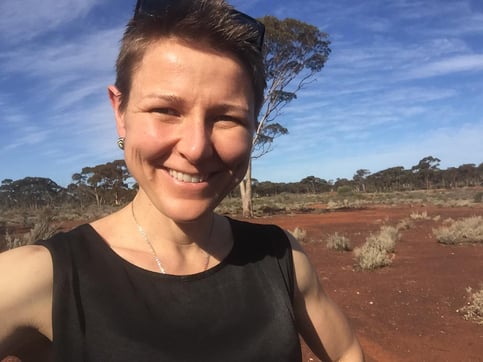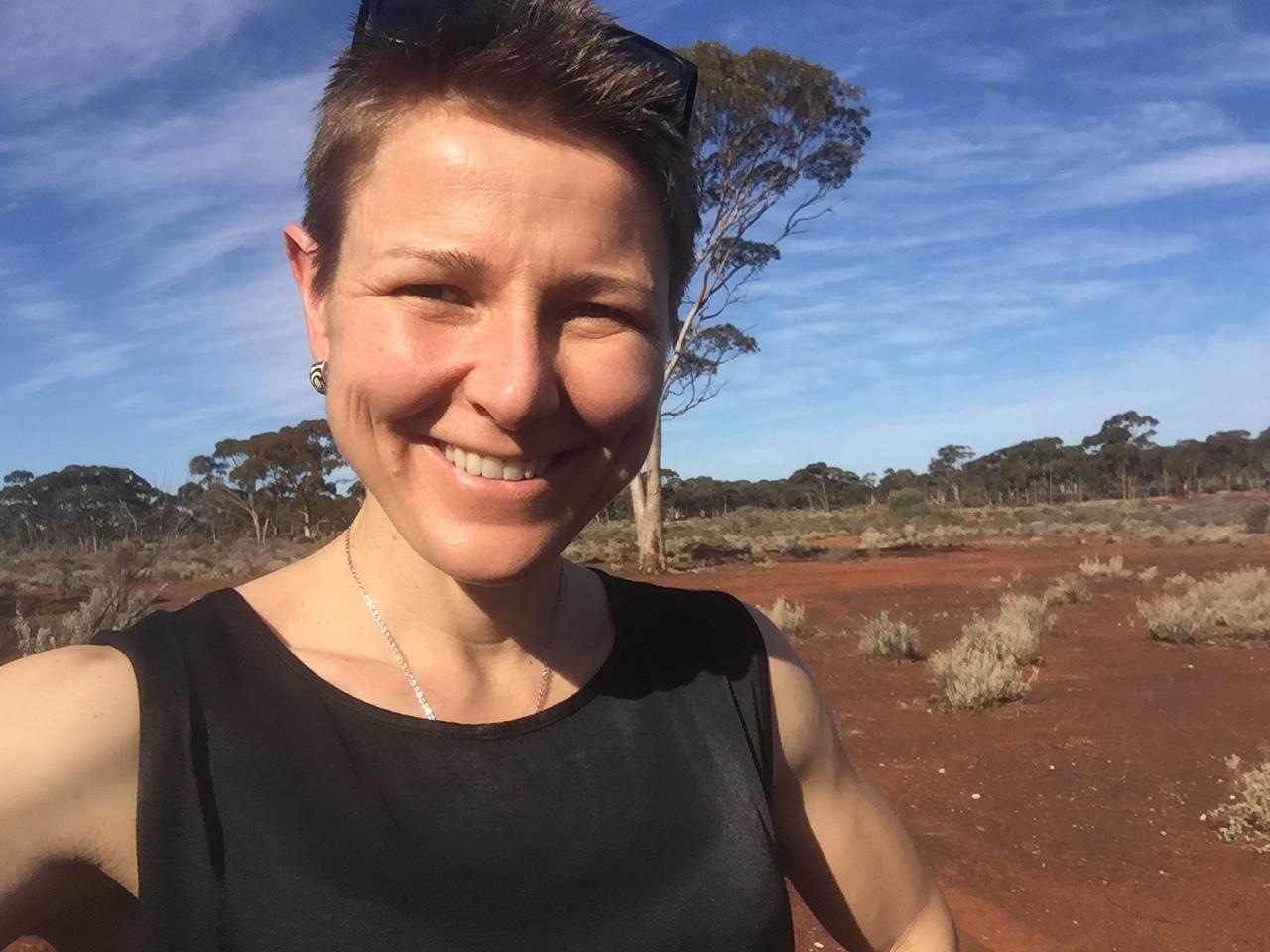The following blog post was written by Angela Leech, an Australian Fulbright Scholar and Delta Kappa Gamma World Fellowship Recipient who is completing a Master’s in Peace and Justice degree at the Joan B. Kroc School of Peace Studies at the University of San Diego. You can read the first piece in this series here.

Anglea Leech
As a Joan B. Kroc School of Peace Studies intern, I had the amazing opportunity to not only work with inspiring advocates but also learn about the profound work my colleagues were doing outside the workplace. In this blog, I will share some of the dynamic changemaking my colleagues are doing with justice reform in the California justice system.
During the past Spring semester, every Thursday morning from Western Australia, I would travel back in time to join my U.S. colleagues at 5.30 pm where it would be Wednesday afternoon. During this time, I would work with a group to virtually co-teach an Arts and Justice Course at Arizona State University. This Graduate course is led by socially-engaged artist and justice reform advocate Associate Professor Gregory Sale, whose artwork is guided by a belief that creativity is a fundamental tool of social transformation. Gregory’s artwork often exists across many unlikely stakeholder groups including reentry communities, prison systems, national sites, arts, academic, and justice institutions. My personal favorite is ‘It’s not just Black and White.’
The Arts and Justice course is one of the many offshoots from the Future IDs at Alcatraz, which is a large-scale collaborative art project led by Sale in collaboration with reentry communities spanning from 2016 to 2019. The Arts and Justice course brings together co-teachers and justice scholars with conviction histories to work with graduate students to learn, discuss, and create new forms of art to address social justice issues. The group of scholars includes Gregory, Future IDs Art and Justice Leadership Cohort, and myself. Members of the cohort include Dr. Luis Garcia, Kirn Kim, Emiliano Lopez, Phillip E. Lester, and Sabrina Reid. Having researched Future IDs for a number of years, I was thrilled when I was able to take up this opportunity through the Joan B Kroc School Internship Program. Each of the cohort members were key collaborators of the Future IDs project. What I find inspiring about this cohort is how each individual member has rechanneled their own experiences of conviction to guide and lead positive change in the justice system, serving those who are caught with the negative cycle of the system.
One great example of this was seen during the East-West Players virtual theatre production, co-written by cohort member Kirn Kim. With creator and director Kristina Wong, Kirn worked with a small circle of Asian Pacific Islanders who’ve either been incarcerated or who have had a loved one in prison. Kirn is an artist and activist who has also spoken out on issues of criminal and juvenile justice reform, and the culture of shame and battling the model minority myth in the Asian/Pacific Islander community. The theatre production was hysterical and moving at the same time. Comedy skits including a Kimchi cooking segment, where the audience was able to learn how to make kimchi in prison. The recipe involved using fermented lettuce gained through a bartering system with guards. My favorite part was when two of the actors awed in disbelief that the Federal Government would spend more on incarcerating people than academic institutions.
Cohort member and colleague Emiliano Lopez shared with us his innovative phone app called Project Protocol. This app creates more equitable relationships between those recently released and surveillance through building community and accountability. The app enables people who have recently returned to the community to rate their parole officer. The concept was generated by Emilian who had a negative experience with parole supervision. Knowing the vulnerable circumstances of some of those under supervision, Emiliano with a team of creatives developed the app, to provide transparency and empower individuals to track and share their experiences on a virtual platform.
Sabrina Reid is a re-entry specialist, advocate, and artist and who has served on the Advisory Board Member at San Francisco District Attorney's Office. This role was captured in Sabrina’s large-scale Future ID that she designed as part of the art project during her time in prison. Now Sabrina serves on multiple boards advocating for women's rights. Dr. Luis Garcia, EdD, serves as the Sr. Director of Programs & Services at the Weingart Center in Los Angeles, supporting LA’s Skid Row community, and helping the homeless and reentry populations transition to permanent housing. Additionally, part of innovative programming offered through the Weingart Centre is the Street Symphony's Music for Change. This program provides people living on the street an opportunity to talk about their past through music and build community.
Juvenile justice activists, business owners, and tattoo artist Phillip Lester, regularly checked into the Arts and Justice course from a community ran tattoo parlor from downtown LA. Phillip is a co-founder of the Reverence Project of Watts which provides support for survivors of crime and community healing. His work as a community activist includes building community-based public safety approaches that don’t rely on the police to intervene and mediate non-violent issues in communities.
A key takeaway that I learned from Gregory and the cohort during this internship was the power of choice. The choice is one of our most valuable assets and is something that is highly restrained within prisons. Artistic opportunities and programs such as Future IDs provide choice. The arts project empowers people and creates space for imagination. The Future IDs project gave people an opportunity to imagine, create, and define their own identities and narratives. For many of those involved in the Future IDs project, the experience of article capturing their own future self, provided the opportunity to reclaim their identity.
The internship reaffirmed my beliefs that it is crucial for individuals who are in prison to have access to creative programs such as art, music, and writing to support people healing and making independent choices.
The opportunity of working with Gregory Sale and learning how one can coordinate an arts practice in a format that advocates for positive social change, significantly impacted my future ambitions within the field. Furthermore, working within the cohort provided insight to a cross-section of positions within the justice field. I was informed about the endless possibilities of how peacemakers can channel their efforts in a multitude of ways to create equality and have an impact the path people choose to take.

About the Author
The Joan B. Kroc School of Peace Studies (Kroc School) at the University of San Diego is the global hub for peacebuilding and social innovation. Founded in 2007, the Kroc School equips the next generation of innovative changemakers to shape more peaceful and just societies. We offer master's degrees in peace and justice, social innovation, humanitarian action, conflict management and resolution, and a dual degree in peace and law — programs that have attracted diverse and dynamic students from more than 50 countries. In addition to our graduate programs, the Kroc School is home to the Kroc Institute for Peace and Justice (Kroc IPJ). Founded in 2001, the Institute supports positive change beyond the classroom. Through groundbreaking research, experiential learning, and forward-thinking programs, the Kroc School and Kroc IPJ are shaping a future in which peaceful co-existence is the new normal.






